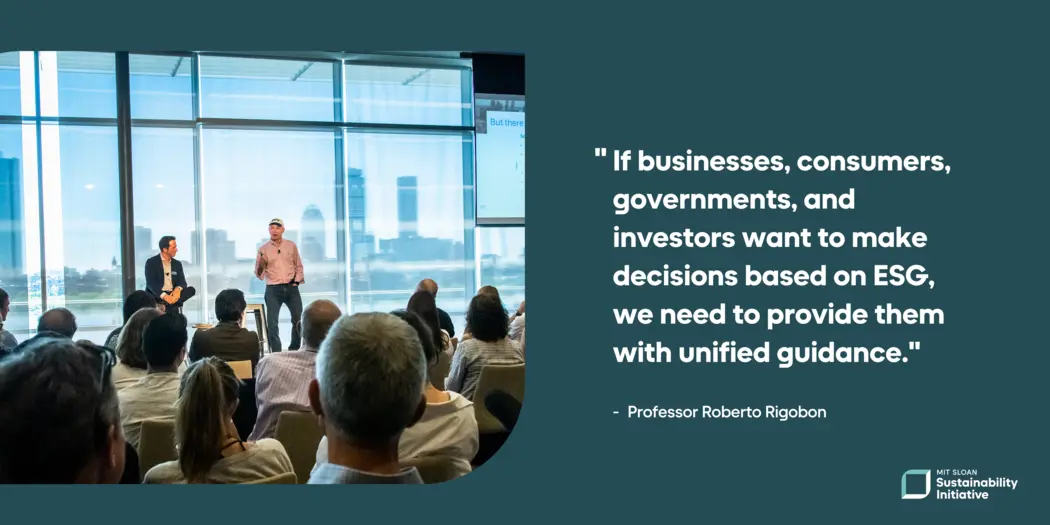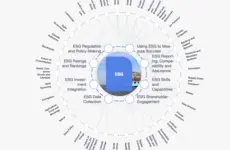MIT Sloan Sustainability Initiative
The Aggregate Confusion Project
Capital markets are moving fast to incorporate Environmental, Social, and Governance factors.
Related Articles
The problem? ESG data are noisy and unreliable.
We found the correlation among prominent agencies’ ESG ratings was on average 0.54; by comparison, credit ratings from Moody’s and Standard & Poor’s are correlated at 0.92. This ambiguity around ESG ratings creates acute challenges for investors trying to achieve both financial and social return.
With our member companies, the Sustainability Initiative has worked to solve this problem through a program of research to improve the quality of ESG measurement and decision making in the financial sector.
We've examined these problems, and potential solutions, in our ongoing suite of research:
Research + Publications
Aggregate Confusion Project Scope
Together, we have charted a new course towards more rigorous and coherent methods for ESG integration. Each member organization has had slightly different business objectives, internal capabilities for ESG research, and priorities among ESG issue areas; but broadly we found there to be a few tasks common to all:
- Reduce the level of noise in measuring specific ESG categories such as labor treatment, carbon emissions, and product safety;
- Understand the effect of ESG-driven investment flows on stock price and firm behavior;
- Develop smarter ways to aggregate ESG factors into composite indices;
- Reliably assess investor preferences to enable ESG indices to be more customized and attuned to investors’ values.
Building a sustainable investment capability inside these firms was a process of engaging people and building their skills and knowledge. Our members received access to top researchers, and the opportunity to engage with our entire team and suite of activities to build their firm’s capacity.
MIT Sloan Sustainability Initiative
Carbon Confusion
A suite of research within the ACP, we are probing fundamental questions around scalability, additionality, asset pricing, and the evolving regulatory environment of carbon markets.
Learn More
Aggregate Confusion Project Leadership Team


Florian Berg
Co-Founder, Principal Research Scientist
Principal Research Scientist, MIT Sloan School of Management
Learn more.
Jason Jay
Co-Founder
Senior Lecturer, Director, MIT Sloan Sustainability Initiative, PhD '05
Learn More
Julian Kölbel
Co-Founder, Research Affiliate
Assistant Professor for Sustainable Finance, University of St. Gallen
Learn more
Roberto Rigobon
Society of Sloan Fellows Professor of Management
Roberto Rigobon is the Society of Sloan Fellows Professor of Applied Economics at the MIT Sloan School of Management, a research associate of the National Bureau of Economic Research, and a Visiting Professor at IESA. Roberto is a macro-economist…
Learn More
Researchers


Florian Heeb
Postdoctoral Associate
Postdoctoral Researcher, MIT Sloan School of Management
LinkedIn
Aneil Tripathy
MCSC Impact Fellow
Impact Fellow at MIT Climate & Sustainability Consortium (MCSC)
LinkedIn
Esther Kohler
Postdoctoral Associate
Postdoctoral Researcher, MIT Sloan School of Management
LinkedIn
Lajos Kossuth
Postdoctoral Associate
Postdoctoral Researcher, MIT Sloan School of Management
LinkedIn
Isabella Loaiza
Postdoctoral Associate
Postdoctoral Researcher, MIT Sloan School of Management
LinkedIn
News + Media

-
Ideas Made to Matter Companies that submit to an audit initially see emissions rise
-
Financial Times | February 23, 2024 Corporate Emissions: Don’t Just Take Their Word For It
-
Financial Times | July 3, 2023 MIT Sloan SI Researchers: Rating the ESG rating agencies
-
The Banker | April 6, 2023 Aggregate Confusion researchers: ESG ratings are still our best option
-
Ideas Made to Matter ESG ratings: Don’t throw the baby out with the bath water
-
Institutional Investor | September 13, 2022 Here Are the Winners of the 2022 Allocators’ Choice Awards
-
The Economist | July 21, 2022 The signal and the noise
-
Foreign Policy | January 10, 2022 Can Global Regulators Save the ESG Movement From Itself?
-
Economic Times India | December 10, 2021 Sustainability-oriented innovations solve public problems
-
Ideas Made to Matter Why sustainable business needs better ESG ratings
-
Ideas Made to Matter 4 strategies for sustainable business
-
World Economic Forum | November 23, 2021 New World Economic Forum "ESG Transformation Map"
-
Wall Street Journal | November 18, 2021 Where Will ESG Investing Be in Five Years?
-
Yahoo Finance | November 3, 2021 Financial firms managing $130 trillion commit to net-zero goals
-
Institutional Investor | October 27, 2021 AQR and MFS Partner With MIT to Solve ESG Data Problem
-
PR Newswire | October 26, 2021 Aggregate Confusion Project welcomes four new investment firms
-
Washington Post | October 10, 2021 Finance Can Save the Planet. It Just Needs Better Data.
-
Fortune | October 11, 2021 Oatly learns that it’s not easy being ‘green’
-
Top1000Funds.com | September 23, 2021 ESG needs better data, better ratings and better products
-
Bloomberg | September 10, 2021 Credit Suisse ESG Head Wants ‘More Pressure’ on Rating Firms
-
Press Rethinking diversity measures in the finance industry
-
Ideas Made to Matter 3 hurdles to sustainable investing — and how to overcome them
-
Wharton | May 25, 2021 How Far Could Pension Funds Drive Sustainable Investing?
-
MIT Spectrum | April 22, 2021 A Business Lens for Sustainability
-
Harvard Business Review | April 2021 Overselling Sustainability Reporting
-
PRI | January 15, 2021 Rewriting history II: The (un)predictable past of ESG ratings
-
London Business School | March 19, 2021 Everything you need to know about ESG investing – for now
-
Top1000Funds.com | January 14, 2021 MIT consortium builds ESG tools
-
Forbes | January 10, 2021 The Curious Case Of Engineering Schools And Sustainable Investing: MIT
-
ChangeInc | November 23, 2020 Assessment of company sustainability policy differs per rating agency
-
CIO Magazine | September 17, 2020 The Hodgepodge of ESG Investment Standards Sparks Controversy
-
Wall Street Journal | September 14, 2020 Massachusetts Pension Overseers Join MIT Sloan ESG Initiative
-
Barron's | September 14, 2020 New SEC Rules May Be Good for Business but Not for Investors
-
VP Bank | October 2, 2020 Award-winning: VP Bank presents the Best Paper Award
-
Press Aggregate Confusion Project: Improving the quality of ESG measurement
-
Forbes | August 4, 2020 Do Signatories To The Principles For Responsible Investment Practice What They Preach?
-
GRASFI | September 11, 2020 Aggregate Confusion: GRASFI Best Paper Prizes
-
Forbes | June 8, 2020 Demystifying ESG: Its History & Current Status
-
Financial Times | May 11, 2020 Fund managers struggle to compare ESG apples with oranges
-
Forbes | April 15, 2020 Municipal Credit Ratings And ESG Ratings: Irreconcilable Differences?
-
Grow The Pie | March 14, 2020 The Inconsistency of ESG Ratings: Implications for Investors
-
Reuters | March 11, 2020 'Thanks Larry!' Green accounting project says BlackRock plug gave it a boost
-
CIM Magazine | February 17, 2020 La production de rapports sur la durabilité est-elle devenue intenable
-
AllAboutAlpha | January 20, 2020 ESG: Why Ratings Diverge
-
Bloomberg | December 11, 2019 Conflicting ESG Ratings Are Confusing Sustainable Investors
-
THE IRISH TIMES | DECEMBER 10, 2019 Are you sure you’re investing ethically?
-
GreenBiz | November 18, 2019 ESG ratings are confounding. For CSOs, that’s good news
-
MIT ALUMNI ASSOCIATION | OCTOBER 22, 2019 A Unique PROMISE to Measure and Incentivize Widespread Prosperity
-
FINANCIAL TIMES | SEPTEMBER 16, 2019 Credit rating agencies join battle for ESG supremacy
-
Ideas Made to Matter ESG ratings vary widely. Here's why










































